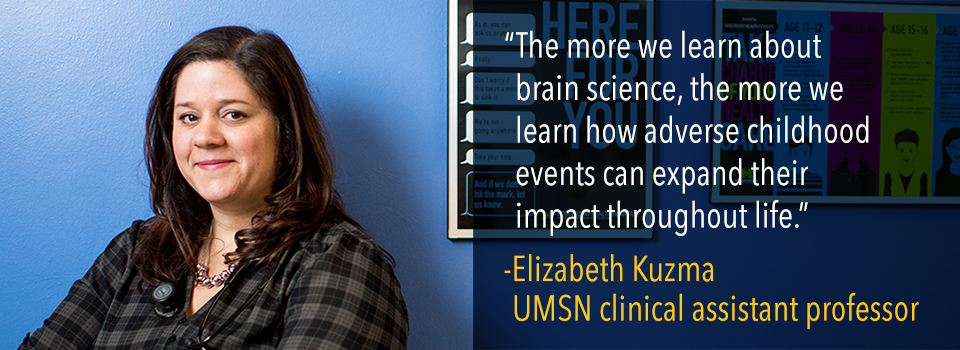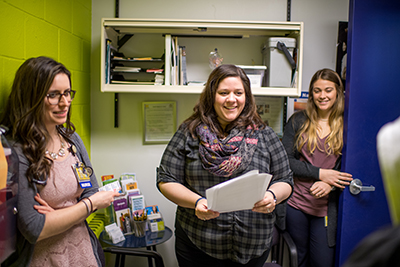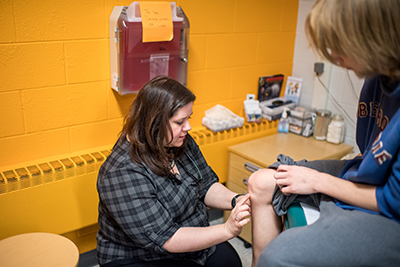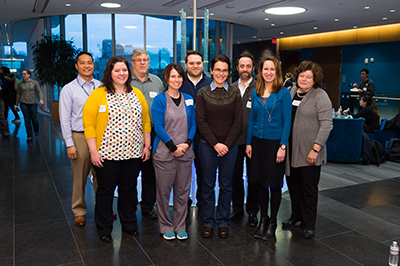Faculty Impact: An advocate for adolescents through practice and beyond

“Some of these kids get mislabeled as bad kids, but they are usually just kids who have had bad things happen to them, and it’s often because of the adults in their lives.”
 Nurse practitioner Elizabeth Kuzma, DNP, FNP-BC, is speaking about adolescents she cares for at the Pathways to Success Academic Campus health center. It’s one of a dozen school-based clinics in Washtenaw and Genesee Counties that are part of Michigan Medicine’s Regional Alliance for Healthy Schools (RAHS). Kuzma’s location is considered an alternative school.
Nurse practitioner Elizabeth Kuzma, DNP, FNP-BC, is speaking about adolescents she cares for at the Pathways to Success Academic Campus health center. It’s one of a dozen school-based clinics in Washtenaw and Genesee Counties that are part of Michigan Medicine’s Regional Alliance for Healthy Schools (RAHS). Kuzma’s location is considered an alternative school.
“A lot of the kids are there because they had trouble at traditional schools,” explained Kuzma. “There may be issues with behavior or substance misuse. We also have teen parents. There are others who had negative experiences in traditional schools and just wanted a new start.”
Kuzma sees first-hand how the negative experiences can permeate to the students’ health. She handles a lot of routine care, but there are many that come with a pressing social component.
“Their health complaints are often a symptom of something deeper,” Kuzma said. “They might come in with a stomachache, but when you ask more questions you find out they have transient housing and don’t have regular access to food.”
Practice informing education and research
In addition to caring for vulnerable adolescents, Kuzma is a clinical assistant professor at the University of Michigan School of Nursing (UMSN). She shares an early-career experience that has stayed with her for years and inspired her to take on a new focus area in teaching.
“I had my first transgender patient and I knew nothing about her needs,” Kuzma said. “It was a disservice to that patient who had to teach me things. There is a deficiency of education and training in the health sciences about caring for LGBTQ patients. It’s become my mission to better prepare our students to care for these patient populations.”
In addition to her focus on LGBTQ populations, Kuzma is dedicated to improving trauma-informed care for people with a history of adverse childhood experiences (ACEs), such as experiencing or witnessing violence, abuse, neglect or mental illness. Part of that effort comes through her role in UMSN’s CASCAID (Complex ACEs, Complex Aid) research group.
“The more we learn about brain science, the more we learn how adverse childhood events can expand their impact throughout life,” she said. “These kids need to be connected with resources to work through issues now so they can have better outcomes for their mental and physical health. That carries over into success in school and jobs so they can have a more secure life.”
Policy
Kuzma is also committed to affecting positive change through policy. She recently participated in an American Association of Colleges of Nursing Faculty Policy Intensive and currently serves as Michigan’s state representative for the American Academy of Nurse Practitioners.
 “As nurses, we often advocate for that one patient we are sitting across from, but I see policy as a way to make broad sweeping change for populations,” she said.
“As nurses, we often advocate for that one patient we are sitting across from, but I see policy as a way to make broad sweeping change for populations,” she said.
A significant piece of Kuzma’s work is advocating for full practice authority for advanced practice registered nurses (APRNs). Many states have restrictions on what APRNs are allowed to do, despite their education and skills training.
While nearly half of American states, including Michigan, have eased some or all of the restrictions, many remain. Certain organizations, primarily those representing medical doctors, have argued against the changes. Kuzma, nurses across the country, and numerous independent organizations such as AARP, are advocates.
“It should be about using all professionals to their full ability because there are a lot of patients who need all of us,” said Kuzma. “More access leads to better outcomes for more people. We’re trying to move towards interprofessional education (IPE) and practice but sometimes we still fight each other and that doesn’t help the patients.”
Interprofessional education
 Kuzma has an active role in IPE at U-M through teaching classes and workshops that bring together students from different health disciplines such as medicine, dentistry and social work.
Kuzma has an active role in IPE at U-M through teaching classes and workshops that bring together students from different health disciplines such as medicine, dentistry and social work.
“Newer providers are being educated in a way that exposes them to what each discipline brings to the table,” she said. “Some schools keep the programs siloed, but U-M students learn pediatrics with pediatric faculty, antepartum care with midwives, pharmacy with pharmacy faculty, and so on. It is special and valuable and I think it gives Michigan students a leg up.”
Commitment to practice
While advocacy and education are important to Kuzma, she has no plans to give up providing hands-on care to vulnerable adolescents.
“It’s intense to hear some of the things these kids have gone through,” she said. “Sometimes we have to call child protective services. Many of them are prime targets for human trafficking because they don’t have the physical and social resources to protect them. They are targets for a lot of bad things. Hearing their stories is hard.”
Despite the emotional toll, Kuzma says the little victories keep her motivated.
“Adolescents often come across as disengaged,” she explained. “But, they are usually listening even when they don’t seem like they are. There are some students you don’t feel like you’ve been able to impact, but sometimes they come back to you and share a success. That makes a good day.”





